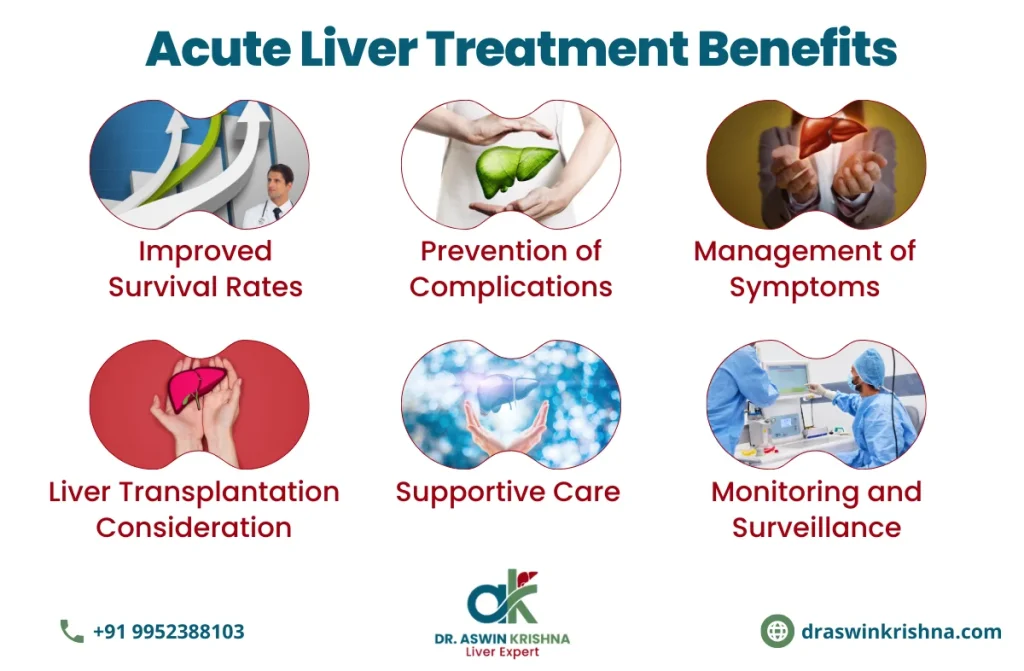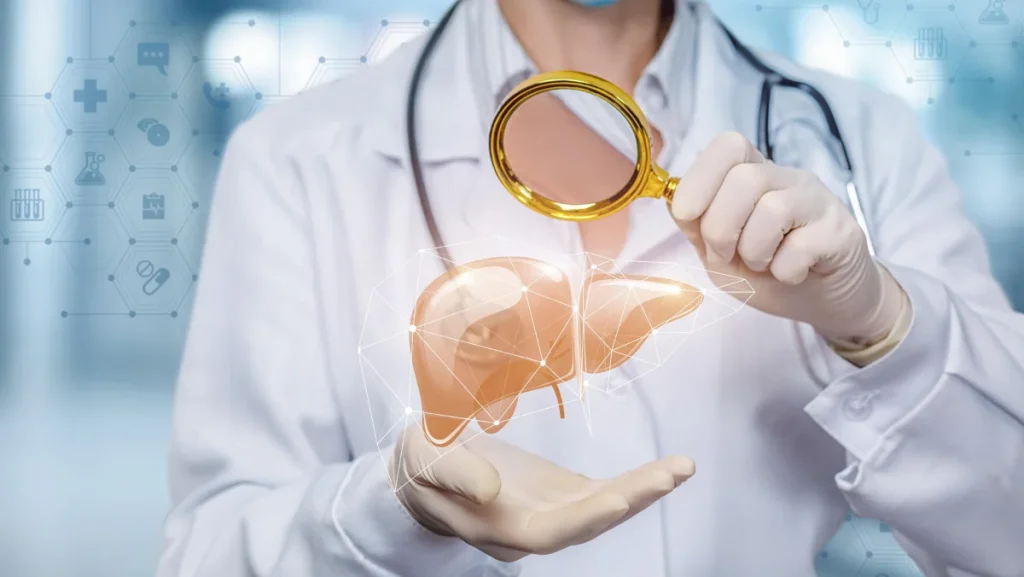Best Acute liver treatment in Chennai is a critical medical condition that demands immediate attention and effective treatment. The liver, a vital organ responsible for detoxification, metabolism, and nutrient storage, can face sudden and severe impairment in cases of ALF. Aims to shed light on the causes, symptoms, and various treatment options available for Acute Liver Failure, with a specific focus on the best treatment in Chennai.
Understanding Acute Liver Failure
Acute Liver Failure (ALF) is a rare yet life-threatening condition characterized by the sudden loss of liver function. Causes include viral infections, drug toxicity, metabolic diseases, and autoimmune disorders. Symptoms such as jaundice, abdominal pain, confusion, and easy bruising may be subtle initially.
For the best acute liver treatment in Chennai, seek expert care with specialists like Dr. Aswin Krishna, ensuring prompt diagnosis and comprehensive management to improve outcomes for individuals facing this critical condition. Early detection and intervention are crucial in addressing ALF effectively.
Early detection is key to managing ALF effectively. Seeking prompt medical attention when symptoms arise can significantly improve the chances of successful treatment. Physicians use a combination of clinical assessments, blood tests, and imaging studies to diagnose ALF and determine its underlying cause.

The Best Acute Liver Treatment in Chennai
When it comes to addressing Acute Liver Failure, the quality of medical care plays a pivotal role. In Chennai, a city known for its advanced healthcare facilities, finding the best treatment for ALF is a priority. Leading hospitals in Chennai offer state-of-the-art infrastructure, experienced medical professionals, and cutting-edge technologies to provide comprehensive care for patients with liver disorders.
The best acute liver treatment in Chennai involves a multidisciplinary approach. Gastroenterologist specialists, hepatologist specialists, and liver transplant surgeons collaborate to deliver personalized care tailored to the specific needs of each patient. From advanced diagnostic tools to innovative treatment modalities, Chennai’s healthcare institutions are at the forefront of liver care.
What is the best treatment for acute liver failure?
The best treatment for acute liver failure depends on the cause and severity. It may include medications, supportive care, and sometimes liver transplantation. Early detection is crucial for successful treatment. Specialized care in hospitals like the Best Acute Liver Treatment in Chennai offers advanced therapies and expert management for better outcomes.
Can you recover from acute liver failure?
Recovery from acute liver failure is possible, especially if treated early. The liver can regenerate, but severe cases may require a liver transplant. Hospitals offering the Best Acute Liver Treatment in Chennai provide comprehensive care to support recovery, including medications, detoxification, and surgery if necessary.
Types of Liver Diseases
- Hepatitis A, B, and C: Viral infections causing liver inflammation treatment in Chennai includes antiviral medication and supportive care.
- Alcoholic Liver Disease (ALD): Caused by excessive alcohol consumption; Chennai’s treatment involves abstinence, nutrition therapy, and medication.
- Non-Alcoholic Fatty Liver Disease (NAFLD): Linked to obesity and diabetes; managed in Chennai with lifestyle changes and medical interventions.
- Autoimmune Hepatitis: Immune system attacking liver; treated in Chennai with immunosuppressants.
- Liver Cirrhosis: Late-stage liver scarring; Chennai offers advanced therapies like liver transplants and management of complications.
Treatment Modalities for Acute Liver Failure
- Medical Management: In many cases, ALF can be managed through medical interventions aimed at stabilizing the patient and supporting liver function. Medications may be administered to address the underlying cause of the liver failure, reduce inflammation, and manage complications. Close monitoring and regular assessments are essential to gauge the patient’s response to treatment.
- Liver Transplantation: Severe cases of Acute Liver Failure may necessitate a liver transplant. Chennai boasts reputable transplant programs that have successfully performed numerous liver transplants, saved lives, and restored health. Timely evaluation of transplant candidacy, meticulous donor selection, and expert surgical techniques contribute to the success of acute liver failure treatment in chennai.
- Nutritional Support: Malnutrition is common in individuals with Acute Liver Failure due to impaired nutrient metabolism. Nutritional support, delivered through specialized diets or intravenous means, plays a crucial role in restoring the patient’s strength and aiding in the recovery process. Leading acute liver failure doctors in Chennai collaborate seamlessly, ensuring patients receive specialized attention.
- Ongoing Monitoring and Follow-up: Best Acute liver treatment in Chennai, after the post-treatment, continuous monitoring is essential for acute liver failure patients. Regular follow-ups with healthcare providers in Chennai, including specialized acute liver failure doctors in Chennai like Dr. Aswin Krishna, ensure effective recovery management. These professionals offer expertise in tracking progress, identifying potential complications, and addressing emerging issues promptly, contributing to comprehensive and personalized post-treatment care for individuals recovering from acute liver failure.
Symptoms of Acute Liver Failure
Recognizing the symptoms of acute liver failure early is crucial for effective treatment. Common symptoms include:
- Jaundice: Yellowing of the skin and eyes.
- Abdominal Pain: Severe pain or discomfort in the upper right side of the abdomen.
- Nausea and Vomiting: Persistent nausea often accompanied by vomiting.
- Confusion or Disorientation: Due to the buildup of toxins in the brain.
- Fatigue: Extreme tiredness and weakness.
- Swelling: Particularly in the abdomen (ascites) and legs.
- Bleeding: Easy bruising or bleeding due to impaired clotting.
If you experience any of these symptoms, seeking the best acute liver treatment in Chennai is vital for timely and effective care.
Causes of Acute Liver Failure
Several factors can lead to acute liver failure, including:
- Viral Hepatitis: Hepatitis A, B, and E are common viral causes.
- Drug Overdose: Excessive intake of medications like acetaminophen (paracetamol).
- Toxins: Exposure to harmful substances like certain herbs, pesticides, or industrial chemicals.
- Autoimmune Liver Disease: The immune system attacking liver cells.
- Metabolic Diseases: Disorders like Wilson’s disease or acute fatty liver of pregnancy.
- Shock or Sepsis: Severe infections or circulatory failure.
Understanding the causes helps in preventing acute liver failure and underscores the importance of prompt treatment from top specialists in Chennai.
Risk Factors for Acute Liver Diseases
Pre-existing Liver Conditions:
- Chronic Hepatitis: Increases the risk of liver inflammation and damage.
- Cirrhosis: Scarring of the liver that can lead to impaired liver function and failure.
Genetic Predisposition:
- Inherited Metabolic Disorders: Conditions like Wilson’s disease, where abnormal copper accumulation damages the liver.
- Hemochromatosis: Excessive iron buildup in the liver can cause acute liver issues.
Lifestyle Choices:
- Excessive Alcohol Consumption: Chronic alcohol use can lead to alcoholic hepatitis and liver cirrhosis.
- Poor Diet: Diets high in fat and sugar can cause non-alcoholic fatty liver disease (NAFLD).
- Obesity: Increases the risk of NAFLD and subsequent liver inflammation.
Infections and Toxins:
- Viral Hepatitis: Infections from hepatitis A, B, and C viruses can lead to acute liver damage.
- Industrial Chemicals: Exposure to toxins like carbon tetrachloride and pesticides can cause liver injury.
- Certain Medications: Overuse or adverse reactions to drugs like acetaminophen and certain antibiotics.
Other Contributing Factors:
- Autoimmune Hepatitis: The body’s immune system mistakenly attacks liver cells.
- Herbal Supplements: Some supplements contain harmful substances that can cause liver toxicity.
Understanding these risk factors is crucial for early detection, prevention, and effective management of acute liver diseases.
Diagnosis of Acute Liver Failure
Acute liver failure is a rapid loss of liver function, often within days or weeks, in individuals without prior liver disease. Prompt diagnosis is essential for effective treatment.
Key Diagnostic Methods
Medical History and Physical Examination
- Medical History: Assess symptoms, medication use, and underlying conditions.
- Physical Examination: Look for jaundice, abdominal tenderness, and confusion.
Blood Tests
- Liver Function Tests: Measure liver enzymes (ALT, AST) and bilirubin.
- Coagulation Tests: Check blood clotting ability.
- Ammonia Levels: High levels indicate hepatic encephalopathy.
- Viral Hepatitis Markers: Test for hepatitis A, hepatitis B, and hepatitis C.
Imaging Tests
- Ultrasound scan: Detects liver size and structure issues.
- CT Scan/MRI: Provides detailed images of liver abnormalities.
Factors That Can Affect the Cost of Acute Liver Failure
The cost of acute liver failure treatment in Chennai can vary depending on several factors:
- Severity of Condition: Advanced stages require more intensive and costly care.
- Type of Treatment: Emergency treatments, including hospitalization and liver transplantation, significantly impact costs.
- Doctor’s Expertise: Treatment by the best acute liver treatment doctors in Chennai might involve higher consultation fees.
- Hospital Facilities: Advanced diagnostic tools and ICU care add to the acute liver treatment cost in Chennai.
- Post-Treatment Care: Ongoing care and medication can affect overall costs.
Understanding these factors can help patients and families plan for the cost of acute liver treatment in Chennai.
Conclusion
Acute Liver Failure is a critical condition that demands swift and effective treatment. Chennai, with its advanced healthcare infrastructure and experienced medical professionals, stands as a beacon of hope for individuals facing this life-threatening condition. Whether through medical management, liver transplantation, nutritional support, or ongoing monitoring, the best acute liver treatment in Chennai encompasses a comprehensive approach to address the complexities of Acute Liver Failure.
Also, Read about Liver Cancer Treatment in Chennai.
